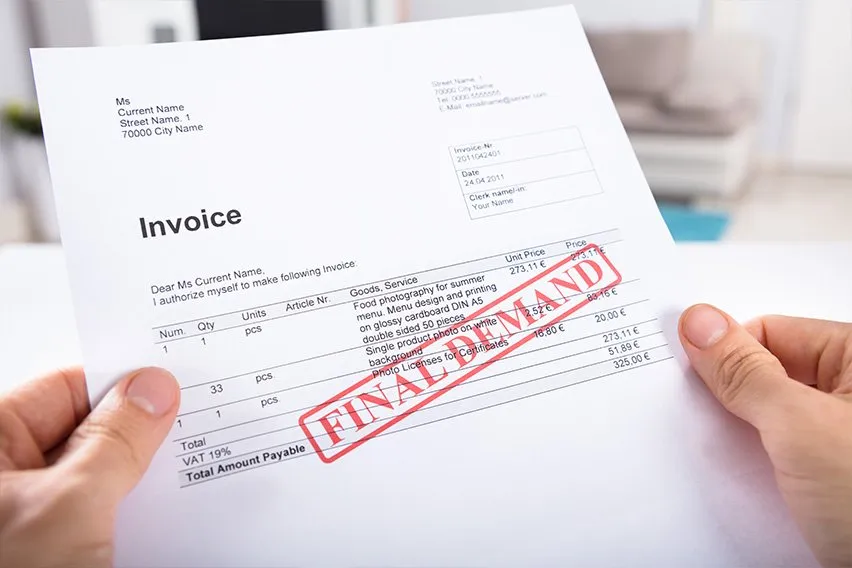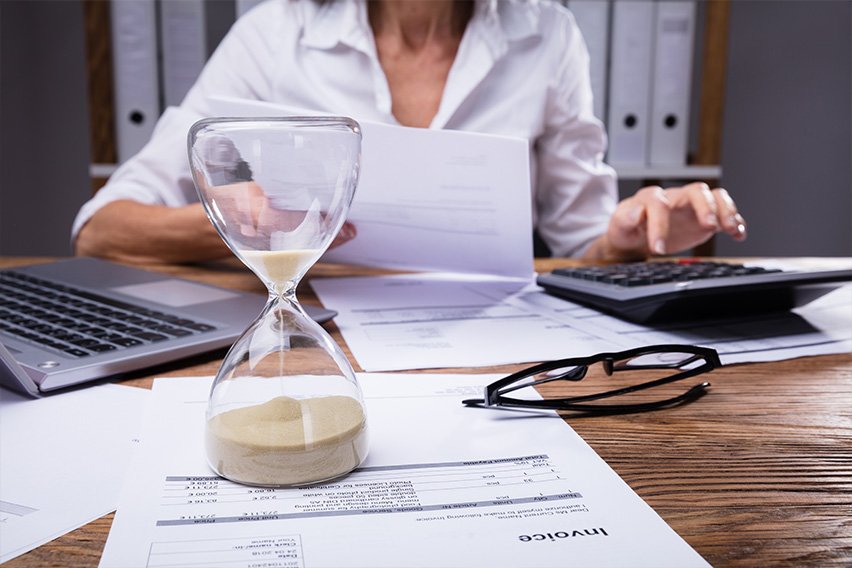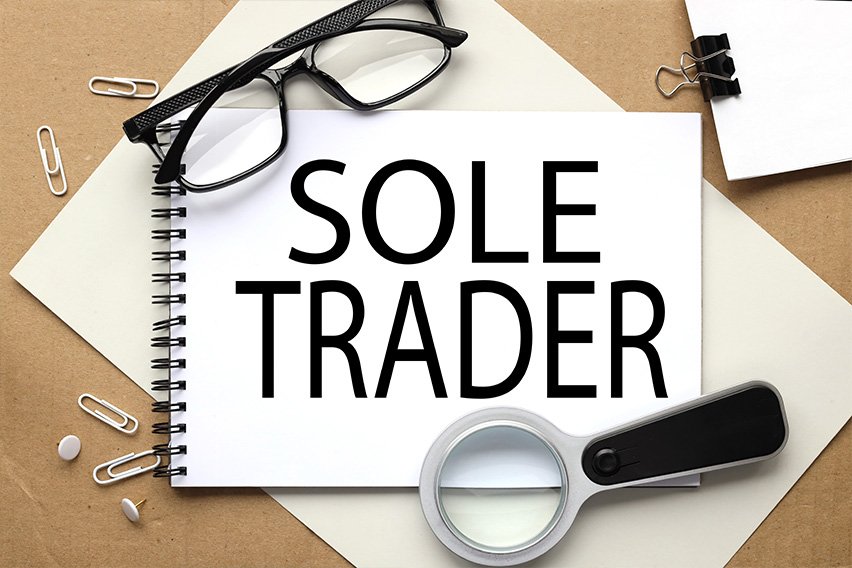Outstanding Invoice: What They Are & Tips To Handle Them

An invoice is a document sent to a customer by a business to detail the products and services purchased and delivered. The invoice establishes the payment obligations, clarifies the payment method, and specifies any due dates.
Invoices are used in countless industries and professions, from individual freelancers to large manufacturing orders. Unfortunately, both ends of the spectrum are at risk of dealing with an unpaid, outstanding invoice.
In this article, we’ll cover everything on this topic, including:
What is An Outstanding Invoice?
How To Handle Outstanding Invoices
Tips For Avoiding Late Payments
The Difference Between An Outstanding Invoice and A Past Due Invoice
What is An Outstanding Invoice?
An invoice is an official notice a business sends to request payment from a client in exchange for goods or services. If an invoice was sent to a customer but hasn’t been paid, it’s considered an outstanding invoice.
Other terms for outstanding invoices include unpaid invoices and open invoices. However, they’re slightly different from past-due or overdue invoices, which refer to outstanding payments after the due date. We’ll go more in-depth on this topic later on.

How To Handle Outstanding Invoices
Whether you’re an independent contractor or a large company, an outstanding invoice can be a hassle. They disrupt the cash flow of your business and can put you in an awkward position from a client relationship perspective.
So how do you handle an outstanding invoice tactfully and respectfully while still getting paid? Here are four strategies:
1. Include A Late Payment Fee
Demanding money for late payments is an excellent way to encourage timely payments of your invoices. However, you need to have a clearly stated late fee policy in your payment terms at the start of the sale. Have your customers sign an agreement before supplying them anything, ensuring they’re clear with the payment terms up-front.
Make your late fees easy to spot and read on the invoice itself. Some businesses might quote a percentage, but why not do the math for your customer for even more clarity? You could format it as simply as this:
Total due by August 1: $200
Total due after August 1: $220
When a customer is entering late fee territory, you could give them a call and offer to waive the fee if they pay right away. Offering a grace period for the first time is a great way to stay on good terms with the customer in case of a simple mistake on their end.
This step is made even easier with FreshBooks! When you invoice with FreshBooks, you can opt to automatically charge a late fee (either a flat rate or a percentage) on past-due invoices. If you want to learn more about late fee charges, follow our guide on How to Calculate Late Fees on Invoices, where we explain various methods to charge a late fee and its calculation.
2. Notifications and Regular Reminders
If a client’s invoice is outstanding and threatening to go past due, you should reach out directly to the customer. The best way to do this is by letter or email rather than phone—at least to start.
In your note, write with a polite tone. Quote your invoice number and due date, and inquire about when you can expect payment. In general, keep the notice short and to the point.
If you send out a message and still haven’t heard back or received payment after a few days, it’s time to give your customer a ring. Again, focus on being friendly, professional, and to the point. Odds are, your client has simply forgotten to deal with the invoice.
When you create an invoice with FreshBooks, you can send automatic reminder emails at any time after the invoice is sent, ensuring your payment isn’t lost in the shuffle. Try it for free here.
3. Send an Overdue Invoice
Sometimes, a busy client simply needs a more obvious reminder to pay you. An effective way to do this visually might be sending an ‘overdue’ invoice.
Print or digitally prepare the same invoice again, adding an ‘overdue’ stamp or watermark to the page. If any late fees apply, as noted in your initial agreement, include them on the overdue invoice as well. You can also send the original invoice in a payment request email, with or without the “overdue” watermark.
4. Use Debt Collectors
If all else fails, it may be time to enlist the help of debt collectors to recover the payment you’re owed. This is a relatively aggressive tactic and one that might damage your relationship with the client. However, you should only use debt collection agencies when the client outright ignores or refuses your payment requests, and the relationship is likely no longer a concern.
If you’re considering using debt collectors, make sure the invoice is actually worth collecting. Though debt collectors don’t require payment upfront, they take, on average, 25% of the amount you get paid in the end. However, the price is well worth it for some to take advantage of this unique skill set—just make sure to consider all other options first.

Tips For Avoiding Late Payments
Even if a client’s invoice isn’t yet overdue, it’s often frustrating to wait around for days or weeks awaiting payment. So how do you go about preventing this troublesome issue? Here are five tips:
Track Invoices
Firstly, it’s vital that you stay organized and on track when it comes to your invoicing. Keep a list of all outstanding invoices in a spreadsheet (or with a handy invoicing tool like FreshBooks), along with information on the date received and the due date. Tracking payments keeps any invoices or late fees from slipping through the cracks.
Establish A Payment Policy
If you want to charge interest or a flat fee on overdue invoices and late payments, you’ll need to establish your policy—and get consent from your client—before work begins. Have your customers sign for your policy by including it in your statement of work or other work agreement, and include it again on your initial invoice as a way to remain transparent.
Take A Percentage Up Front
If you’re concerned about customers trying to act dishonestly by not paying for your goods or services, it may be worth asking for a deposit upfront. While this isn’t customary in all industries, it’s a good way to determine which clients are serious. This also tends to come with more professional behavior regarding invoices and prompt payment.
Allow Recurring Payments or Payment Plans
Sometimes, a customer can’t pay the full balance by the due date, which means they’ll likely not pay at all. However, you always have the option to set up payment plans or recurring payments with your clients. This allows them to pay in installments, making it more manageable for them and providing cash flow for you.
A payment schedule is a great way to receive your money while still being gracious to your customers. And while it can be a fair bit of work to organize manually, tools like the FreshBooks Payment Schedule feature make it simple.
Payment Schedules in FreshBooks allow you to create a payment plan for your clients so that they can pay invoices in multiple and partial installments on dates of your choosing. This saves you from creating multiple invoices or continually editing an existing invoice whenever a new payment is due.
Utilize Accounting Software
In general, modern accounting software has made the entire process of invoicing and charging late fees much, much more straightforward for businesses. FreshBooks has an integrated, easy-to-use dashboard feature to keep track of outstanding invoices, ensuring you’re always on pace to get paid promptly.
The Difference Between An Outstanding Invoice and A Past Due Invoice
An outstanding invoice is one that a client has yet to pay but has not yet exceeded the due date. The client’s accounts payable department will track all outstanding invoices and schedule them for payment. The accounts payable department receives the invoices, reviews them for accuracy, seeks management approval, and records them into their preferred accounting system. To ensure timely payment to vendors, accounts payable departments often set up a schedule.
An overdue invoice is an invoice a company has yet to pay and is past the invoice due date. Failure to pay the invoice by a due date makes an invoice overdue. These invoices might carry a penalty late fee that customers must pay in full along with the originally invoiced total. Past-due payments usually appear on a company’s accounts payable report and often appear on the top. They may also indicate how many days a payment has been late.

Key Takeaways
A lot of that thought goes into the respectful yet effective handling of overdue invoices. There are several different approaches to handling an outstanding invoice from fees to phone calls to friendly reminders. These contact methods are great ways to deal with overdue payments when used properly and with discretion.
If you’re looking for a way to get paid more quickly, manage the invoicing process easily, and remain in good standing with your clients while doing it, modern tools are a must. With a full-service suite of invoicing services, FreshBooks can help you stay organized and keep in touch with clients, ensuring your revenue stays steady.
To learn more about FreshBooks—and try it for free—check out our features page.
FAQs on Outstanding Invoices
Still have questions about dealing with late invoices? Here are some of the most frequent discussion points on this topic—answered.
Do Unpaid Invoices Expire?
As long as a business has provided satisfactory work for a client as agreed upon, the business has the legal right to demand an outstanding payment (and any associated late fees). However, there is a limitation to this right: in the US, you can only consider the invoice outstanding for six years. If it remains unpaid after that, your only option is to take legal action by filing a suit for non payment of services.
How Do I Get Paid for an Outstanding Invoice?
There are a few ways to get paid for an outstanding invoice. You can contact the client via mail, email, or telephone with an updated overdue invoice or take a more aggressive approach with debt collectors or lawyers.
Can I Sell My Unpaid Invoices?
If you need cash quickly and your clients aren’t paying their overdue invoices, you can take a different approach: selling them to collections in a practice known as factoring. Though you’ll get less doing this than if you had been paid directly, it’s a great way to get some of what you’re owed and move on with your life.
What Happens When An Invoice is Past Due?
Every business or contractor has their own payment terms and policy regarding past-due invoices. However, it’s commonplace to see late fees—either as a flat rate or a percentage-based fee—on overdue invoices.
About the author
Jason Ding is a seasoned accountant with over 15 years of progressive experience in senior finance and accounting across multiple industries. Jason holds a BBA from Simon Fraser University and is a designated CPA. Jason’s firm, Notion CPA, is an accounting firm with a business-first focus. The firm specializes in preparing personal and corporate taxation while providing fractional CFO work and leading the accounting and finance function for several small-to-medium-sized businesses. In his free time, you’ll find Jason on the basketball court, travelling, and spending quality time with family.
RELATED ARTICLES


 What Is a Supplier Invoice?
What Is a Supplier Invoice? What Is a VAT Invoice? Charging Value-Added Tax to EU Clients
What Is a VAT Invoice? Charging Value-Added Tax to EU Clients What Does FOB Mean on an Invoice? | Shipping Invoice Definitions
What Does FOB Mean on an Invoice? | Shipping Invoice Definitions Flat Rate vs Hourly Rate: What Should You Choose?
Flat Rate vs Hourly Rate: What Should You Choose? How to Invoice for Hourly Work
How to Invoice for Hourly Work How to Invoice as a Sole Trader: Guide and Example
How to Invoice as a Sole Trader: Guide and Example